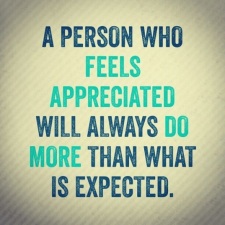 “The only tyrant I accept in the world
“The only tyrant I accept in the world
is the still small voice within me”
Mahatma Gandhi.
Maybe Gandhi “accepted” it because he realised that he had the power to change it…. Or perhaps he knew that he had the choice how much attention he actually paid to it?
So, what do we do with, if indeed we notice, the still small voice within? Part of our development of EQ skills is to develop self awareness so, pay attention and notice your inner voice. Believe me, it is always with you!
Our inner dialogue or self-talk is hugely powerful and influences us in a powerful way, moment to moment. Our state in any moment is influenced hugely by what we are listening to and not just the words. The WAY we are talking to ourselves has more impact than the words we are listening to.
Years ago, when I was teaching communication skills to Health Care Professionals, I always emphasised the importance of tonality, pace, etc. as being crucial to the meaning of the message when communicating to another individual. When I began to run Corporate programmes about stress management and resilience, I did teach about self talk – and yet I admit, initially, I focussed mainly on the what of what we are saying to ourselves. A little on the how, yet way too little.
It was, however, only when I sat in a room with several hundred others as an NLP Practitioner delegate, and learned from Richard Bandler about the power of submodalities, that the learning really took off for me!!
Those skill drills eliciting submodalities were so important. The exercises in changing them were truly lessons in driving the bus as Richard would say!
I am guessing that, at times, we can all identify with the tyrant concept that Ghandi referred to.
Sometimes that inner voice is anything BUT still and small. It can be downright loud, destructive, tyrannical even. It can certainly lead us to feelings of depression, guilt, anger, frustration, panic fear, anxiety and other states far removed from and overwhelmingly different from the happiness and freedom available within.
When we talk to ourselves in positive words matched with a positive tonality and get the pitch, volume and inner smile in the voice, boy does it feel different!
Much of my work with clients in and outside corporate land is around giving people tools with which to achieve more joy… one of those sets of tools is about managing their voice within!
Below is a summary of what they and I learn and practice!
Firstly to pay attention to and to notice how you are feeling and tune in to your inner voice as if tuning into a radio!!!
1. Notice the inner dialogue
2. Pay attention to what it is saying
3. Notice HOW you are hearing the voice, is it gentle soothing, encouraging and supportive or sarcastic, belittling, frightened or sad?
4. Consider what that voice may be getting you to pay attention to and act upon? (Remember there will be a positive intention – tricky though it may be to discern!) .
5. If the voice is useful and you are feeling great, keep going and do more of it! Ramp it up!
6. If it isn’t getting you to feel the way you need to in the situation, take action.
After all, there isn’t really anyone there, just a set of neural pathways firing off – electrical activity represented as a voice.
For many clients, corporate and private, this image in itself is enough to get them to take control. They can picture a set off pathways and the electrical activity and imagine putting a block in, a “STOP” sign, so that the pathway can’t fire off in the same way any more.

Easy to visualise and very effective.
If the voice persists, there are several techniques which, if you are a practitioner of NLP you will be aware of.
Case study
I often tell the story of a client called “Ryan” who learned how to have better conversations in his head with fabulous results for his happiness and achievement.
Ryan was 10 years old when I worked with him.
His father called me and told me that Ryan had a promising tennis career and yet had “lost all of his confidence”. He had become anxious, increasingly worried, and had become fearful about playing matches. Whilst he was fine in training, he had lost every match in recent weeks. Could I help?
I wanted first to elicit whether I was talking to a father who had sights set on a Grand Slam Title and whether Ryan was keen or reluctant to climb up the tennis ladder. A quick chat to Ryan convinced me. The young man LOVED his tennis and wanted to enjoy his matches and to win again.
Ryan and I worked together once and kept in touch by phone.
This young man had developed a very critical, frustrated, irritated, superior and aggressive inner voice.
“You are useless at Tennis, the other boy will be better than you, you will miss all your shots, you may as well give up, you’re a useless failure”
Those were just a few of the hypnotic suggestions he was bathing in on a daily basis!
He wanted to enjoy his tennis, feel happy confident and motivated to win with a lovely mix of excitement and anticipation before and during his matches.
He wanted the feeling of winning, success and celebration back!!
Mastering his inner voice was the key to him achieving his desired change. We did other things too yet the major shift came when he changed his inner dialogue!
I gave him several tools with which to do this. The one he liked best and used the most was imagining he was listening to a track on his Ipod and simply changing tracks!! After all, why would he listen to something that was making him feel bad!?
I then asked him to imagine tuning to a different track, an audio book yet that didn’t seem to help.
We had been talking about favourite Tennis players, TV shows, movies, etc., so I seized an idea (the client will always provide the answer!!)
I asked him to create his own inner confidence coachand to imagine what that person would say to him about his tennis… I suggested his favourite player and many times Grand Slam Champion (mistake Bridget, too directive, remember the rules!) and he said, very cutely……
“Do I have to have a tennis player?”
“No” I said, it’s your brain – you can have whoever you like.”
“I know who I will have,” he said suddenly and, as he did so his whole physiology changed. He sat up tall, smiled and I knew the change we were waiting for had happened!!!
“Who will you have then?” I asked.
“Mr T” he said!!! (What a fabulous coach strong, solid, confident and BIG!!!)
“Fantastic” I said – “A fabulous coach! After all he’s on the A team.”
Ryan who was on a roll then said “Is it OK if I have two?”
“Who else have you got on your team now then”I asked.
“Rocky“ grinned Ryan!!! And he got even taller – if that was possible!
I got him to close his eyes and imagine walking in court with Mr T on one side and Rocky on the other, with Eye of the Tiger blaring through the speakers and – job done!
We did some great visualisations, more work on building great states and then, off he went, head held high – and brimming with confidence and a great big smile.
He started to win his matches again and, whilst he may or may not become a Grand Slam Champion, he now has an idea and a sense of what it could feel like!!
Inner Tyrant to Inspirational Inner Coach in a short session!
Ryan’s story has inspired many of my adult clients both private, and at CEO and Director level in corporate land. Whilst the tyrant may well pop up from time to time, it’s good to remember who is in charge.
Is your own inner dialogue always helpful? If not, use the techniques I taught to Ryan and notice the difference. Message me about your experiences and do get in touch is you would like to know more.
Until Next time.
Bridget





